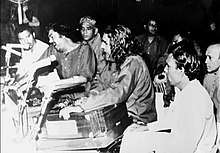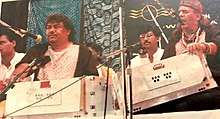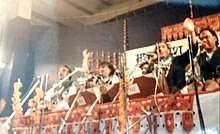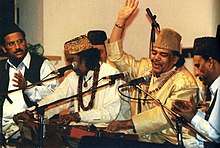Maqbool Ahmed Sabri
Maqbool Ahmed Sabri (12 October 1945 – 21 September 2011) was a Pakistani Qawwali singer, and a prominent member of the Sabri Brothers, a well-known qawwali group in Pakistan during the 1970s–1990s. Sabri Brothers were honoured with the Pride of Performance award by the President of Pakistan in 1978.[2]
"Shahenshah-e-Qawwali" Maqbool Ahmed Sabri | |
|---|---|
 | |
| Background information | |
| Born | 12 October 1945 Kalyana, Punjab Province, British India (now in Haryana, India) |
| Died | 21 September 2011 (aged 65)[1] South Africa |
| Genres | Qawwali, Ghazal, Sufi music |
| Instruments | Vocals, harmonium |
| Years active | 1955–2011 |
| Spouse(s) | 2 Spouses |
Early life
Born in Kalyana in eastern Punjab, Maqbool was initially educated in the Hindustani classical music tradition by his father Ustad Inayat Hussain Sabri And His Beloved Elder Brother Ghulam Farid Sabri. Their family came from a musical background, and claimed direct descent from Mian Tansen, who had played at the court of the 16th-century Mughal emperor Akbar. Mehboob Baksh Ranji Ali Rang, his paternal grandfather, was a master musician of his time; Baqar Hussein Khan, his maternal grandfather, was a unique sitarist. His family belongs to the Sabriyya order of Sufism, hence the surname Sabri. The family made the perilous journey to Karachi during the partition of India in 1947, though Maqbool was almost left behind and rejoined the family party only when a servant found him still in the house – he had to run to catch up, clutching one of his instruments. Maqbool Ahmed Sabri initially learnt music from his father Ustad Inayat Hussain Sabri and his elder brother Ghulam Farid Sabri. Later, Maqbool Ahmed Sabri and his elder brothers Ghulam Farid Sabri And Kamal Ahmed Sabri furthered their knowledge of music under Ustad Fatehdin Khan, Ustad Ramzan Khan, Ustad Kallan Khan, Ustad Latafat Hussein Khan Rampuri, And their Spiritual Master Hazrat Hairat Ali Shah Warsi.
Career




Showing musical talent from a young age, with the help of his father, Maqbool formed a Qawwali group at the age of eleven and named it Bacha Qawwal Party. His first public performance was in 1956 at an Urs ceremony held at the home Of Mr. Jameel Amrohi, where he sang Do Alam Baka Kul Giraftar Daari in the presence of giant Qawwals of that time. Soon afterwards, his elder brother Ghulam Farid Sabri, who was then performing with Ustad Kallan Khan's Qawwali party, joined him after insistence by their father and became the leader of the party, which soon came to be known as Sabri Brothers.
Their first recording, released in 1958 under the EMI Pakistan label, was the Urdu Qawwali, Mera Koi Nahin Hai Teray Siwa. Their later hits included Tajdar-e-Haram (King of the Kaaba, 1975) and Balaghal Ula Be Kamalehi (Reaching the Highest Heights Through Perfection, 1977), Saqia Aur Pila, O Sharabi Chorde Peena. They have sung many Qawwalis in Persian like Nami Danam Che Manzil Boodh, Chashm-e-Mast-e-Ajabe, etc. of Amir Khusro and also Man Kunto Maula and Rang of Amir Khusro. They have also sung a Kalaam of Imam Ahmed Raza Khan which is in four languages—Arabic, Persian, Urdu, and Hindi. The kalaam is Lam Yaati Nazeeruka Fee Nazarin.
Maqbool was considered a master of improvisational wordplay, often making references in Urdu and Punjabi, as well as Persian or Arabic, to historical events or to traditional poetry. Maqbool Sabri was considered to be one of the best classical singers.[3] Maqbool Sabri also sang ghazal which included Tere Ghungroo Toot Gaye,Aa Jan-e-Wafa, Kabhi Tanha Beith Ke,Gul Badan Gul Pairhan, Jab Kabhi Aankh Milate Hain, Din Ek Sitam, Mere Mizaj Ki Awargi and Aaina Tordh Diya
Maqbool Ahmed Sabri was also a poet who wrote famous qawwalis which included Koi Mujhse Pooche Mai Kya Chahta Hoo Madine Mei Thodi Jagah Chahta Hoo, and Ajmer Ko Jaana Hai etc.
Qawwalies featured in films
Several of their qawwalis have featured in films. Mera Koi Nahin Hai Teray Siwa appeared in the 1965 film Ishq-e-Habib, Mohabbat Karne Walo Hum Mohabbat Iss Ko Kehtain Hain in the 1970 film Chand Suraj, Aaye Hain Tere Dar Pe in the 1972 film Ilzam, Bhar Do Johli Meri Ya Muhammad in the 1975 film Bin Badal Barsaat, Teri Nazr-e-Karam in the 1976 film Sachaii, Tajdar-e-Haram in the 1982 film Sahaaray, Mamoor Horha Hai in the 1977 film Dayar-e-Paighambran and Aftab-e-Risalat in the 1977 Indian film Sultan-e-Hind, Tere Dar Ko Chord Chale in the 1988 Indian film Gangaa Jamunaa Saraswathi, a solo ghazal sung by Maqbool Ahmed Sabri.
Foreign concerts
The Sabri Brothers is the only qawwali troupe which has a "first class" status on the Pakistan Television Corporation. Popular film and recording artists in Pakistan, the Sabri Brothers troupe has toured Europe, Asia and the Middle East. In 1970 the Government of Pakistan sent them to Nepal as representatives for the royal wedding. They were the first exponents of Qawwali to the West, when they performed at New York's Carnegie Hall in 1975. In 1975 they performed in the United States and Canada under the auspices of The Performing Arts Program of The Asia Society. In April 1978, the album Qawwali was recorded in the United States, while the Sabri Brothers were on tour. The New York Times review described the album as "the aural equivalent of dancing dervishes" and the "music of feeling."[4]
In June 1981, they performed at the Royal Tropical Institute in Amsterdam.[5] They played the Womad festival in the UK in 1989 – one of a series of appearances there – and released the album Ya Habib (O Beloved) on Peter Gabriel's Real World Records label the following year. In 1996, after death of Ghulam Farid Sabri he performed at the Brooklyn Academy of Music-Next Wave Festival, as part of a double-bill with alternate-rockers Cornershop, Voices Of God Event in 1999 Held at Marrakesh.
Personal life
In the 1960s he took allegiance of Warsi order of Sufisim along with his most loved companion and elder brother Ghulam Farid Sabri, on the hands of Hazrat Ambar Ali Shah Warsi. After the death of Ghulam Farid Sabri, Maqbool Ahmed Sabri was deeply saddened and could not bear the death of his elder brother. Maqbool Ahmed Sabri married twice, he did not had any child from his first wife. In 1977 Maqbool Ahmed Sabri married for the second time, He married an Indian girl named Fatima residing in South Africa. His first wife passed away during his life time. He is survived by his wife Fatima, a son, Shumail, and his daughters, Ameema Shah, Gulerukh, Kanza and Tunanza.[3]
Death
Maqbool Ahmed Sabri was treated in a hospital in South Africa for two months because he was suffering from heart problems and diabetes. He died in South Africa on Wednesday 21 September 2011 due to cardiac arrest. He was buried near his brother Ghulam Farid Sabri's grave.[6][7][8]
His legacy was carried on by his younger brother Mehmood Ghaznavi Sabri, and his elder brother Ghulam Farid Sabri's son, Amjad Sabri.
On 22 June 2016 (in Ramdan), his nephew Amjad Farid Sabri was shot dead in Liaquatabad, Karachi, Pakistan. Amjad Farid Sabri was buried near his grave.
On 3 October 2018, his nephew, Azmat Farid Sabri, died.
On 27 May 2020, his elder brother Ghulam Farid Sabri's wife died.[9]
Awards and recognition
- Pride of Performance (Tamgha E Husn E Kaarkardagi) Award by the President of Pakistan in 1978 for the whole Sabri Brothers Group.[10]
- Spirit of Detroit Award by Federal government of the United States for Ghulam Farid Sabri in 1981.[10]
- Khusro Rang for both Ghulam Farid Sabri and Maqbool Ahmed Sabri (India) in 1980.[10]
- Bulbul E Pak O Hind by President of India and President of Pakistan Pakistan for both Ghulam Farid Sabri and Maqbool Ahmed Sabri in 1977.[10]
- Charles De Gaulle Award by Charles de Gaulle for both Ghulam Farid Sabri and Maqbool Ahmed Sabri in 1983.[10]
- The Doctorate Degree was awarded to The Sabri Brothers as an honor for their super – hit record Shikwa Jawab E Shikwa (Of Allama Iqbal), by University of Oxford
- Tansen Samman (India) was awarded to Maqbool Ahmed Sabri in 2005 by Government of Madhya Pradesh.
References
- "Exclusive biography of #AmjadFaridSabri and on his life". Filmibeat.com. Retrieved 31 July 2017.
- "Maqbool Ahmed Sabri's body reaches Karachi – The Express Tribune". The Express Tribune. 24 September 2011. Retrieved 31 July 2017.
- "Founder of Sabri Brothers, masters of qawwali". Pakistantoday.com. Retrieved 31 July 2017.
- "Qawwali: Sufi Music of Pakistan". Nonesuch Records Official Website. Retrieved 12 April 2016.
- "KIT Publication: Tasleem". Web.archive.org. Retrieved 23 April 2020.
- "Maqbool Ahmed Sabri: Saying goodbye". The Express Tribune., Published 22 September 2011. Retrieved 12 April 2016
- "Obituary: Maqbool Sabri of Sabri Brothers passes away". The Express Tribune., Published 21 September 2011. Retrieved 12 April 2016
- "Maqbool Sabri obituary". apnaorg.com. Obituary on Academy of the Punjab in North America website. Retrieved 12 April 2016
- https://www.geo.tv/latest/290069-famed-qawwal-amjad-sabris-mother-dies-in-karachi
- "Sabri Brothers -Maqbool Ahmed Sabri Remembers Ghulam Fareed 1994 Taziati Program 2". YouTube. 5 April 2011. Retrieved 23 April 2020.